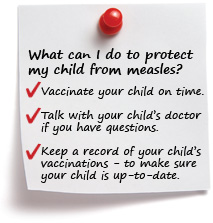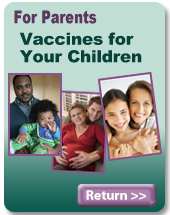Measles - Fact Sheet for Parents
Diseases and the Vaccines that Prevent Them
Español: Sarampión
Printer friendly version[358 KB, 2 pages]
Benefits of MMR vaccine
- Saves lives.
- Protects young children from serious disease.
- Keeps others safe.
Side effects of the MMR vaccine
- The most common side effects are usually mild and include the following:
- Fever in 1 out of 6 people
- Mild rash in 1 out of 20 people
- Swollen glands in the cheeks or neck in very few people
- Fever high enough to cause a seizure (jerking or staring) occurs in 1 out of 3,000 people. These seizures do not cause any long-term harm
- Temporary joint pain and stiffness (mostly in teens and adults)
- Serious allergic reaction to the MMR vaccine occurs in fewer than 1 in a million people
What is measles?
Measles is a serious respiratory disease caused by a virus. It spreads easily through coughing and sneezing. In rare cases, it can be deadly. The measles, mumps, rubella (MMR) vaccine protects against measles.
What are the symptoms of measles?
- Measles starts with a fever, which can get very high.
- Soon after, it causes a cough, runny nose, and red eyes.
- Then a rash of tiny, red spots breaks out. It starts at the head and spreads to the rest of the body.
- The rash can last for a week, and coughing can last for 10 days.
- Some children who get measles also get diarrhea or an ear infection.
How serious is measles?
Measles can be dangerous, especially for babies and young children. In the United States in 2011, 42% of children under 5 years old who had measles had to be treated in the hospital.
For some children, measles can lead to pneumonia, a serious lung infection. It can also cause lifelong brain damage, deafness, and even death. One to three out of 1,000 children in the U.S. who get measles will die from the disease, even with the best care. About 150,000 to 175,000 people die from measles each year around the world—mostly in places where children do not get the measles vaccine.
How does measles spread?
Measles spreads when an infected person breathes, coughs, or sneezes.
It is very contagious. You can catch measles just by being in a room where a person with measles has been, even after that person is gone. And you can catch measles from an infected person even before they have measles rash.
What is the MMR vaccine?
The MMR vaccine is a shot that combines vaccines for three diseases—measles, mumps, and rubella. The vaccine protects children by preparing their bodies to fight the measles virus. Almost all children (95 children out of 100) who get two doses of MMR vaccine will be protected from measles.
Why should my child get the MMR vaccine?
Getting your child the MMR vaccine protects him or her against measles. It also protects other people who can’t get the vaccine. For example, babies under 1 year old are too young to get the vaccine, but they can still get sick with measles. Also, children with cancer or other serious problems with their immune systems cannot be vaccinated. A high level of vaccination in the community helps protect these children.
One mom's measles story
Megan Campbell knows first-hand how serious measles can be. Her 10-month-old son got measles from an infected child in the waiting room at his doctor’s office. That child, who was not vaccinated, had gotten measles while on a trip outside of the U.S.
Megan’s son got better and had no lasting effects of the illness. But he was very sick with measles. He spent 3 days in the hospital with an IV (a needle in the vein to give fluids) because he was unable to eat or drink. When he went home, he had another week of illness and high fevers.
At 10 months, Megan’s son was too young to get the MMR vaccine. That’s why he got sick with measles. At 12 months, Megan took him to get the MMR vaccine. Even though he couldn’t get measles again, his mom knew the vaccine would protect him against mumps and rubella, two other serious diseases.
Says Megan: “This way, he won’t suffer from mumps or rubella, or spread them to anyone else.”
When should my child get the MMR vaccine?
Children should get two doses of the MMR vaccine for best protection:
- The first dose at 12 through 15 months, and
- The second dose at 4 through 6 years of age.
Children often get MMR vaccine at the same time as other vaccines. This is safe, even for young children.
During an outbreak, health officials may recommend the MMR vaccine be given to infants younger than 12 through 15 months of age, sometimes even to children as young as 6 months of age.
Additionally, measles is still common in many countries, including Europe, Asia, the Pacific, and Africa. Worldwide, about 20 million people get measles each year. So, the risk of measles may be very high for unvaccinated U.S. residents who travel abroad. Two doses of MMR vaccine are recommended for all international travelers 12 months or older. Infants 6 through 11 months of age should get one dose before traveling.
Is the MMR vaccine safe?
The MMR vaccine is very safe, and it is effective at preventing measles (as well as mumps and rubella). Vaccines, like any medicine, can have side effects. Most children who get the MMR vaccine have no side effects. Those that do occur are typically very mild, such as a fever or rash.
 If my child does not get the MMR vaccine, will he get measles?
If my child does not get the MMR vaccine, will he get measles?
Almost everyone who has not had MMR vaccine will get measles if they are exposed to the measles virus.
Before the measles vaccination program started in 1963, about 3 to 4 million people got measles each year in the United States. Also, about 48,000 people were hospitalized, 1,000 suffered brain damage or became deaf, and 450 died because of measles each year.
Thanks to the MMR vaccine, measles no longer circulates year round in the United States. But, measles is still common in other parts of the world, including Europe, Asia, the Pacific, and Africa. Unvaccinated people can get measles when they are in other countries and bring it into the United States. They can infect other people, which can cause outbreaks in their communities.
Today, only about 60 people in the United States are reported to have measles each year. But this number can go up when people don’t get the vaccine and are exposed to measles. In the late 1980s, measles cases went way up—and so did measles deaths—due to large numbers of unvaccinated children in some communities.
In 2011, the number of people reported to have measles in the United States was higher than usual. There were 222 people who were reported to have the disease. That’s more than any year since 1996. Measles sent 31% of these people to the hospital. People who had measles spread the disease to others. This caused 17 different measles outbreaks in 2011.
Where do measles cases in the United States come from?
Most measles comes into the United States by U.S. travelers who recently traveled internationally and foreign visitors.
Some people in the United Stateschoose not to get their children the MMR vaccine. These children are at higher risk for getting measles. And they can spread the disease to others in their communities, including to babies who are too young to get the vaccine and others who cannot get vaccinated because of certain health conditions.
Is the MMR vaccine linked with autism?
No, many large and reliable studies of MMR vaccine have been done in the U.S. and other countries. None has found a link between autism and the MMR vaccine.
There are a couple of reasons why people believe autism is linked to vaccination. The first is because sometimes signs of autism do not appear until around the age the MMR vaccine is given. If a child is diagnosed shortly after getting vaccinated, this may seem like the vaccine caused autism.
Another reason some people think MMR is linked to autism is a study published in 1998 from the United Kingdom. One of the authors claimed that the MMR vaccine could contribute to the development of autism. That study got a lot of attention in the news. Since 1998, 10 out of 13 of the study’s authors have withdrawn their support of the study, and the journal has retracted it.
Where can I learn more about the MMR vaccine?
To learn more about the MMR vaccine or other vaccines, talk to your child’s doctor.
Call 800-CDC-INFO (800-232-4636) or go to the CDC Vaccines web site and check out the following resources:
Fact Sheets for Parents
Diseases and the Vaccines that Prevent Them
![]() This symbol means you are leaving the CDC.gov Web site. For more information, please see CDC's Exit Notification and Disclaimer policy.
This symbol means you are leaving the CDC.gov Web site. For more information, please see CDC's Exit Notification and Disclaimer policy.
Copyrighted images: Images on this website which are copyrighted were used with permission of the copyright holder and are not in the public domain. CDC has licensed these images for use in the materials provided on this website, and the materials in the form presented on this website may be used without seeking further permission. Any other use of copyrighted images requires permission from the copyright holder.
Contact Us:
- Centers for Disease Control and Prevention
1600 Clifton Rd
Atlanta, GA 30333 - 800-CDC-INFO
(800-232-4636)
TTY: (888) 232-6348 - New Hours of Operation
8am-8pm ET/Monday-Friday
Closed Holidays - cdcinfo@cdc.gov




